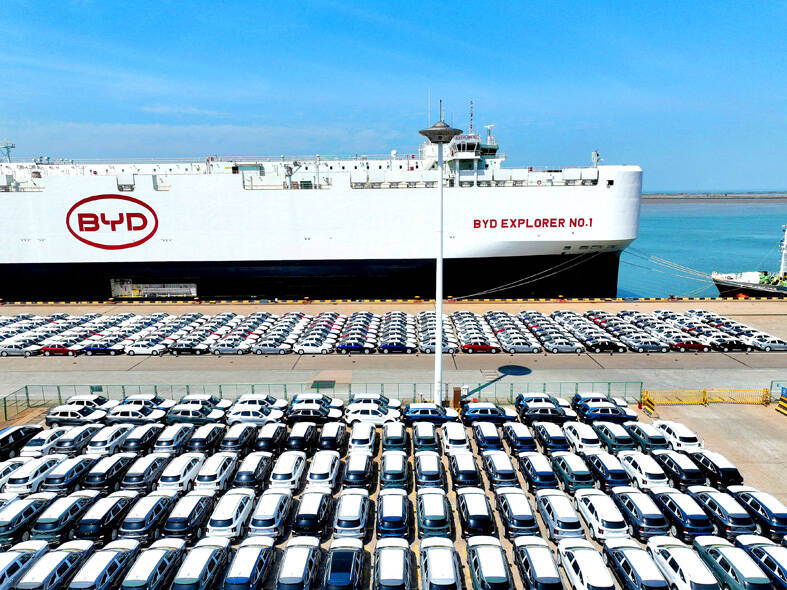Chinese brands last month captured 11 percent of the European electric vehicle (EV) market, notching record registrations as manufacturers raced to beat stiff EU tariffs that took effect early this month.
SAIC Motor Corp (上海汽車) led the charge, shipping its MG4 hatchback to dealers in volume, according to analysts at researcher Dataforce, which compiled the figures.
Vehicles registered before July 5 could be sold to customers without the added duties on imported EVs.

Photo: Reuters
Chinese brands registered more than 23,000 battery EVs across the region during the month, the most ever, Dataforce figures showed.
Their 72 percent sequential jump from May was twice the gain in overall European EV registrations for last month.
Chinese-made imports from Western manufacturers, including Volvo Car AB, BMW AG and Tesla Inc, are also subject to the new duties.
Whether the volume gains can be sustained will be closely watched in the coming months, as the added EU tariffs take hold. The EU’s provisional charges subject SAIC to an additional 38 percent charge, while BYD Co (比亞迪) is to pay an extra 17 percent on the existing 10 percent customs duty.
Automakers on both continents are rushing to add European EV manufacturing so they can avoid the new duties, while tensions between Beijing and Brussels risk devolving into a trade war.
While state-owned SAIC was responsible for the biggest jump in Chinese-branded imports, about 40 percent of the MG4s registered last month were self-registrations by dealers — “not a very healthy growth,” Dataforce product head Gabriel Juhas said.
The company is offering generous leasing deals, including a two-for-one MG4 promotion in Germany, where EV sales have sputtered.
Conversely, there were signs of progress for BYD, the world’s largest EV maker.
A marketing push centered on the Euro Cup Championships in Germany gained traction with consumers, Dataforce analyst Julian Litzinger said.
Another driver of the European EV market last month was the introduction of incentives in Italy, which helped to spur a doubling of battery EV sales in the country from a year earlier.
About 200 million euros (US$216.65 million) in new EV subsidies ran out in less than nine hours, the Italian government said in a statement.
About 60 percent was tapped by families and the rest by companies.
The rise vaulted Italy, which has been lagging in EV sales, into the top six of a regional market that includes EU states, countries like Norway and Switzerland that participate in its single market, and the UK.

Sweeping policy changes under US Secretary of Health and Human Services Robert F. Kennedy Jr are having a chilling effect on vaccine makers as anti-vaccine rhetoric has turned into concrete changes in inoculation schedules and recommendations, investors and executives said. The administration of US President Donald Trump has in the past year upended vaccine recommendations, with the country last month ending its longstanding guidance that all children receive inoculations against flu, hepatitis A and other diseases. The unprecedented changes have led to diminished vaccine usage, hurt the investment case for some biotechs, and created a drag that would likely dent revenues and

Global semiconductor stocks advanced yesterday, as comments by Nvidia Corp chief executive officer Jensen Huang (黃仁勳) at Davos, Switzerland, helped reinforce investor enthusiasm for artificial intelligence (AI). Samsung Electronics Co gained as much as 5 percent to an all-time high, helping drive South Korea’s benchmark KOSPI above 5,000 for the first time. That came after the Philadelphia Semiconductor Index rose more than 3 percent to a fresh record on Wednesday, with a boost from Nvidia. The gains came amid broad risk-on trade after US President Donald Trump withdrew his threat of tariffs on some European nations over backing for Greenland. Huang further

CULPRITS: Factors that affected the slip included falling global crude oil prices, wait-and-see consumer attitudes due to US tariffs and a different Lunar New Year holiday schedule Taiwan’s retail sales ended a nine-year growth streak last year, slipping 0.2 percent from a year earlier as uncertainty over US tariff policies affected demand for durable goods, data released on Friday by the Ministry of Economic Affairs showed. Last year’s retail sales totaled NT$4.84 trillion (US$153.27 billion), down about NT$9.5 billion, or 0.2 percent, from 2024. Despite the decline, the figure was still the second-highest annual sales total on record. Ministry statistics department deputy head Chen Yu-fang (陳玉芳) said sales of cars, motorcycles and related products, which accounted for 17.4 percent of total retail rales last year, fell NT$68.1 billion, or

MediaTek Inc (聯發科) shares yesterday notched their best two-day rally on record, as investors flock to the Taiwanese chip designer on excitement over its tie-up with Google. The Taipei-listed stock jumped 8.59 percent, capping a two-session surge of 19 percent and closing at a fresh all-time high of NT$1,770. That extended a two-month rally on growing awareness of MediaTek’s work on Google’s tensor processing units (TPUs), which are chips used in artificial intelligence (AI) applications. It also highlights how fund managers faced with single-stock limits on their holding of market titan Taiwan Semiconductor Manufacturing Co (TSMC, 台積電) are diversifying into other AI-related firms.